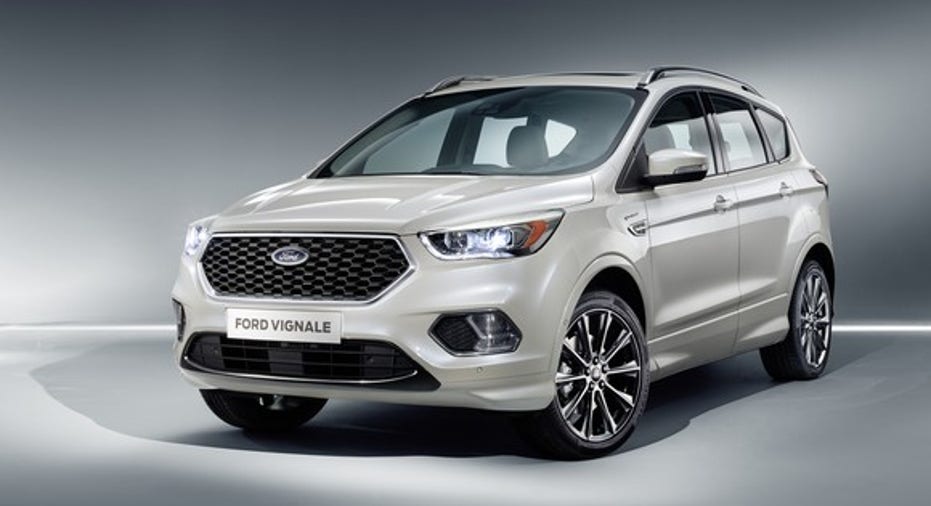Why Ford Is on Track for Another Nice Profit in Europe

A Ford Mustang in Lisbon, Portugal. Despite high taxes that make gasoline very expensive, the brawny Mustang is catching on in Europe. Image source: Ford Motor Company.
Ford Motor Company (NYSE: F) said that its sales in Europe rose about 8.5% in August from a year ago, as it seeks to build on a very profitable first half of 2016 in the Old World.
Growth in overall sales, but a small slip in market share
Ford sold about 74,800 vehicles in the 20 western and central European markets that it considers its core European market in August. That's up 8.5% from a year ago, but it trailed the overall market's gain of almost 10%. Put another way, Ford's market share in what it calls the "Euro 20" slipped 0.3 points to a still-strong 7.6% on the month.
For Europe as a whole, including Russia, Turkey, the former Soviet republics, and the countries of eastern Europe, Ford's sales were up about 2.3% year over year in August. Its market share for what it calls the "Euro 50" dropped 0.3 points to 7.3%.
Profitable formulas are still working for Ford in Europe
The good news is that Ford's most profitable product lines are doing particularly well.
Commercial vehiclesare a Ford strength around the world, and Europe is no exception. Sales of Ford's commercial vehicles, including the Transit van line and Ranger pickup, were up 15.3% in August. They're up 17.6% year to date, making Ford the top commercial-vehicle brand in Europe so far this year.
SUVs are also doing well for the Blue Oval in Europe. The Kuga, better known to Americans as the Escape's European twin, had its best-ever August in Europe, while the recently added Edge is gaining ground.
Performance cars don't sell in huge volumes, but they do generate outsized profits. They've become a priority for Ford around the world under CEO Mark Fields. European sales of the Fiesta ST, Focus ST and RS, and Mustang as a group were up 51% in August. Ford noted cheekily that for the second month this year, the Mustang out-sold the Porsche 911 on its home turf to become Germany's top-selling sports car in August.
Well-optioned models. Employing another strategy that has worked well for it elsewhere, Ford has worked to create appealing upscale versions of its mainstream models in Europe.
Ford's Kuga Vignale is a (very) loaded version of the vehicle that Americans know as the Escape. Vignale models are big profit generators for Ford in Europe. Image source: Ford Motor Company.
Well-optioned and premium-trim versions of mainstream models carry outsized profit margins, and just as luxurious versions of the F-150 are a huge profit center for Ford in the U.S., the Titanium and Vignale versions of mainstream models like the Mondeo (twin to the Fusion sedan) and Kuga are big profit centers. Ford said that its "high series models" have accounted for almost 60% of its retail sales in Europe this year through August.
The upshot: Ford is on track for another profitable quarter in Europe
After years of losses in the Old World, things have turned around in a big way for Ford. Ford Europe generated $901 million in pre-tax profit in the first half of 2016.
Ford executives have said that Europe's usual seasonal selling patterns, as well as some Brexit-related pressures, could dampen its European results in the second half. That may be so. But July's results were strong, and August's were also solid. The good news is that two-thirds of the way through the third quarter, the key drivers of profit for Ford in Europe appear to still be on track.
A secret billion-dollar stock opportunity The world's biggest tech company forgot to show you something, but a few Wall Street analysts and the Fool didn't miss a beat: There's a small company that's powering their brand-new gadgets and the coming revolution in technology. And we think its stock price has nearly unlimited room to run for early in-the-know investors! To be one of them, just click here.
John Rosevear owns shares of Ford. The Motley Fool owns shares of and recommends Ford. Try any of our Foolish newsletter services free for 30 days. We Fools may not all hold the same opinions, but we all believe that considering a diverse range of insights makes us better investors. The Motley Fool has a disclosure policy.



















